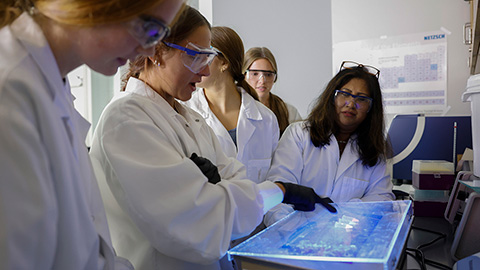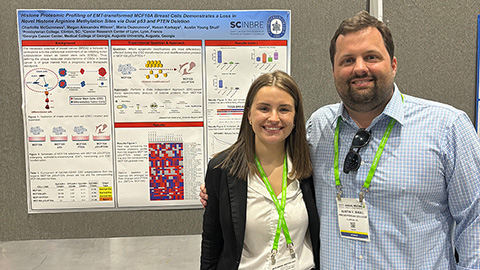
I am a homicide survivor
“Never shall I forget that night … Never shall I forget those moments which murdered … my soul and turned my dreams to dust. Never shall I forget these things, even if I am condemned to live as long as God Himself. Never.”
ELIE WIESEL, “NIGHT”
On May 1, 2018, I woke up tired and hungry. I drove to the Texaco down the street to grab breakfast and enough rations to keep me hyped up on caffeine and junk food.
I was a student in the graduate school at The University of Alabama, and I’d stayed up late the night before, cramming for the integrated genomics final exam I had to take the next day. I was in for another marathon day of studying.

The sun shone brightly, quickly warming the humid air. Radio blaring, I danced around in the car, attempting to sing along with Bone Thugs-N-Harmony’s “1st of tha month.” Only a few more days, and then I’d be free to do as I pleased with my summer. I was giddy with anticipation. Much of the remaining day was unremarkable. I studied as much as my brain could manage. I remember seeing something on Facebook about a homicide near my hometown, but they didn’t share names or any details, so I didn’t think much of it.
At around 10 p.m., I went to the kitchen to grab a quick snack. I walked down the hall and saw Trey, my roommate, sitting on the couch in the living room, playing Madden NFL on his Xbox. His cell phone rang, and I thought he said my name, but he waved me off.
I grabbed a bowl of cereal, and, not wanting to disturb Trey’s call, I went back to my room to eat. A few minutes later, as I was carrying my dirty bowl to the kitchen sink, I apologized to Trey for interrupting his call. I said I could have sworn I’d heard him say my name.
A look of horror was on his face. It was as if he’d seen a ghost: his eyes wide open and back straight as a board. He told me it was my mom who called and patted his hand on the couch, gesturing for me to sit beside him.
“Your dad was working at a man’s house ...”
He drew it out. His tension seemed to cause the “and” to hang in the air.
“Where is he?” I blurted out, hopping up to go wherever Dad was, to be with him in what I was assuming was a critical condition. “Where is he, Trey?”
My dad, Allen Clifford Sandlin, had been doing construction work at the home of Hernan Antonio “Tony” Padilla. Tony was a relative newcomer to town and at the time the thought was maybe there’d been a fight and somehow my dad and Tony had been killed.
I began crying hysterically. I was on the floor in front of the couch, shaking the coffee table, causing the glass to bang around in its grooves. Stoic, Trey sat on the couch beside me and was silent.
I called my mom for more details and she reiterated what Trey had said.
Then I called my PI, Laura Reed. By now, it was past 11 p.m. and she still answered my call. Much like Trey had done, she was quiet and listened as I screamed and cried. The next morning, she texted to see what she could do for me.
I had no idea why I called her, but later I realized it was because she was my safe space. Her office was a place where I could be honest about my mental health struggles and where I could vent my frustrations. She believed in me before I could believe in myself.
Laura’s support kept me in graduate school, especially after Daddy died. I’m happy to report that I finished my master’s. Over the past five years, I’ve juggled school, work and the criminal justice system.
Another homicide survivor once told me that, on the days when I feel like giving up, I need to remember that “I am my father’s voice.” I took that to heart. I never missed a court hearing, never didn’t drop everything to drive an hour to the district attorney’s office for a last-minute meeting, and never ever stopped being my dad’s voice. It took five years and 11 days to finish the longest and hardest marathon I will ever run, but I can report that the perpetrators are now serving time in the state penitentiary.
The five people who murdered my father have all seen my face in court and heard about the pain they caused. A few cried, one stared through me as if he was annoyed he had to listen to me, and another yelled. No matter what, I kept going back and being the voice to show that my dad once existed.
The detectives determined that the five assailants went to Tony’s house to rob and kill him and my dad was a witness that had to be eliminated.
Through all the hearings and court procedures, my PI never once said a negative word about me being absent. When things got so bad I had to take a few days off, she left me a plant outside my door.
I would have quit graduate school if not for Laura, or rather, I would probably have been kicked out if I’d had almost anyone else as a PI. She now serves as the program director for the Genomics Education Partnership, where I work as the director of curriculum.
What Laura gave me can’t be measured on a tenure and promotion list.

Enjoy reading ASBMB Today?
Become a member to receive the print edition four times a year and the digital edition monthly.
Learn moreGet the latest from ASBMB Today
Enter your email address, and we’ll send you a weekly email with recent articles, interviews and more.
Latest in Opinions
Opinions highlights or most popular articles

The tortoise wins: How slowing down saved my Ph.D.
Graduate student Amy Bounds reflects on how slowing down in the lab not only improved her relationship with work but also made her a more productive scientist.

How pediatric cataracts shaped my scientific journey
Undergraduate student Grace Jones shares how she transformed her childhood cataract diagnosis into a scientific purpose. She explores how biochemistry can bring a clearer vision to others, and how personal history can shape discovery.

Debugging my code and teaching with ChatGPT
AI tools like ChatGPT have changed the way an assistant professor teaches and does research. But, he asserts that real growth still comes from struggle, and educators must help students use AI wisely — as scaffolds, not shortcuts.

AI in the lab: The power of smarter questions
An assistant professor discusses AI's evolution from a buzzword to a trusted research partner. It helps streamline reviews, troubleshoot code, save time and spark ideas, but its success relies on combining AI with expertise and critical thinking.

How AlphaFold transformed my classroom into a research lab
A high school science teacher reflects on how AI-integrated technologies help her students ponder realistic research questions with hands-on learning.

Writing with AI turns chaos into clarity
Associate professor shares how generative AI, used as a creative whiteboard, helps scientists refine ideas, structure complexity and sharpen clarity — transforming the messy process of discovery into compelling science writing.

